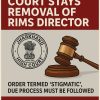DGP Anurag Gupta was scheduled to retire on 30 April 2025. The Jharkhand Government, however, extended his service tenure till July 2026 without seeking prior approval from the Central Government. This move contravened established norms regarding All India Services, prompting a swift response from the Centre.
Central Government’s Response 🚨
Summary: The Ministry of Home Affairs (MHA) intervened by invoking Article 355 of the Constitution, asserting that the extension was illegal without the Union’s consent. The Ministry sent an official communication to the Jharkhand Chief Secretary, directing strict compliance with the service rules and ordering DGP Anurag Gupta’s retirement on the due date.
Also Read: Articles of the Constitution: Article 21
Legal and Constitutional Aspects 🔒
Summary: Article 355 obligates the Centre to protect states against external aggression and internal disturbance and to ensure that the government of every state is carried on in accordance with the Constitution. By using this provision, the Centre signalled that the tenure extension violated constitutional norms. The action underscores the delicate balance between state autonomy and centralised oversight under India’s federal structure.
Exact Wording of Article 355:
“It shall be the duty of the Union to protect every State against external aggression and internal disturbance and to ensure that the government of every State is carried on in accordance with the provisions of this Constitution.”
Key Points to Understand:
-
🛡️ Protection: The Union must safeguard states from external attacks (e.g., foreign invasion) and internal unrest (e.g., insurgency, rebellion).
-
⚖️ Constitutional Governance: The Centre ensures that the state governments operate within the framework of the Constitution (i.e., not violating constitutional principles).
-
🚨 No Direct Action Alone: Article 355 alone does not give the Centre the power to directly intervene.
Instead, it acts as a justification for actions under Articles 356 (President’s Rule) and 352 (National Emergency). -
🧩 Link to President’s Rule: If a state’s constitutional machinery breaks down, the Centre can recommend President’s Rule (Article 356), using Article 355 as a basis.
-
📚 Example Usage: As in the case of DGP Anurag Gupta’s tenure extension by Jharkhand, the Centre cited Article 355 to remind the state of constitutional compliance.
Impact on Centre-State Relations 🛉
Summary: This incident reignites the debate over Centre-State relations in India. It questions the extent of autonomy states enjoy concerning administrative appointments and brings to light the overarching powers of the Centre to maintain constitutional order. Similar past instances, where the Centre invoked constitutional provisions to correct or control state actions, are relevant for competitive exam aspirants.
Points to Remember 🔹
- DGP Anurag Gupta was scheduled to retire on 30 April 2025.
- Jharkhand Government extended his tenure till July 2026 without Union consent.
- The Centre invoked Article 355 to declare the extension illegal.
- Ministry of Home Affairs directed the state to proceed with Gupta’s retirement.
- Official communication emphasised strict adherence to service rules.
- Non-compliance could lead to constitutional intervention.
- Highlights limitations of state autonomy in administrative matters.
- DGP Anurag Gupta had earlier faced action from the Election Commission.
- Emphasises the Centre’s power to enforce constitutional compliance.
- Raises crucial questions about India’s federal structure.


